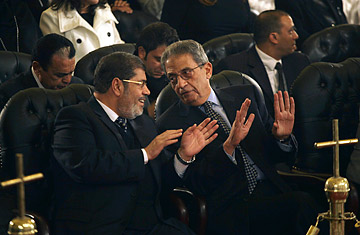
Mohamed Morsi, left, of Egypt's Muslim Brotherhood and Egyptian presidential hopeful Amr Moussa, right, talk before Christmas Eve mass, led by Coptic Pope Shenouda III at the Coptic cathedral in Cairo, Egypt, Jan. 6, 2012.
The new year in Egypt has ushered in a new parliament, dominated for the first time in Egypt's history by Islamists. And with that comes the question of just how those newly empowered Islamists — led by the Muslim Brotherhood with nearly half the seats — will run the country.
Some activists and politicians have predicted that a violent confrontation will ensue between the military and the Islamist bloc, as a tug-of-war for power and influence, particularly in the drafting of Egypt's new constitution, engulfs the months ahead. They say the Islamist parties, who together hold roughly 62% of parliament, will push forward with the implementation of Shari'a — Islamic law — as well as legislation to curtail the military's power and immunity. And they predict that the military will do everything in its power to stop them. "This would give us a new Algeria," says Islam Ahmed Abdallah, a follower of the ultra-conservative Salafi interpretation of Islam, who runs a center geared toward combatting "Christian evangelism." Egypt's Islamists have a history of violent struggle against the regime, he reasons. And if the military challenges their rightfully won authority, Egypt could deteriorate into the kind of violence that wracked Algeria in the 1990s after its military pre-emptively shut down a similar Islamist win.
But other analysts say that a dramatic power play simply isn't in the cards. Rather, argues Kent State University political scientist Joshua Stacher, the dynamic has already been drafted, and it has little to do with extremists like Abdallah, who, embodied in the Salafi Nour party, now control an estimated quarter of the seats in parliament. "The real negotiations will happen at the top of the regime between the Muslim Brotherhood and SCAF [the ruling Supreme Council of the Armed Forces]," he says.
The Brotherhood spent decades organizing, despite the heavy-handed repression inflicted by the regime of President Hosni Mubarak. After participating in the uprising to oust him last winter, the Brotherhood quickly rose to become Egypt's most powerful political party. With their dominance in parliament solidified, the players who matter in charting Egypt's future have been whittled down to two big ones: the Muslim Brotherhood, and the powerful military that Mubarak left behind. Stacher is hardly the only observer to speculate that the two actors are already deeply engaged in closed-door negotiations for Egypt's future distribution of power. Egyptian liberals have warned of such a conspiracy since the spring, alleging that a negotiated partnership kept the Brotherhood out of Tahrir Square (where the liberals have directed their protests against the military council) and cemented the group's win in elections.
The Brotherhood has categorically denied any such backroom deals. But recent weeks of politicking suggest that they also have little intention of throwing their lot in a coalition with their fellow Islamists, the Salafis. Brotherhood officials made it clear this week that they have abandoned earlier calls for Egypt to become a parliamentary — rather than presidential — system, in a move that lifts pressure off the military, and will likely spark condemnation from the ultra-Islamists and liberals. A top Brotherhood official told The New York Times that the group would accept the leadership of military-appointed Prime Minister Kamal al-Ganzouri until July, by which point the military has already said an elected president will take power.
